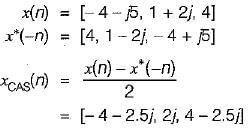GATE Exam > GATE Questions > Consider the sequencethe conjugate anti-symme...
Start Learning for Free
Consider the sequence

the conjugate anti-symmetric part of the sequence is

the conjugate anti-symmetric part of the sequence is
- a)

- b)

- c)

- d)

Correct answer is option 'A'. Can you explain this answer?
Verified Answer
Consider the sequencethe conjugate anti-symmetric part of the sequence...

Most Upvoted Answer
Consider the sequencethe conjugate anti-symmetric part of the sequence...
Given Sequence:
The given sequence is x[n] = [-4-j5, 1+j2, 4].
Conjugate Anti-symmetric Part:
To find the conjugate anti-symmetric part of the sequence, we need to compute the conjugate of each element and then subtract it from the negation of its reversed sequence.
Let's calculate the conjugate of each element:
- Conjugate of -4-j5 = -4+j5
- Conjugate of 1+j2 = 1-j2
- Conjugate of 4 = 4
Now, let's reverse the sequence and negate it:
Reversed sequence = [4, 1+j2, -4-j5]
Negation of reversed sequence = [-4, -(1+j2), -(4+j5)]
= [-4, -1-j2, -4-j5]
Next, we subtract the conjugate of each element from the negation of the reversed sequence:
Conjugate Anti-symmetric part = [-4+j5 - (-4), 1-j2 - (-1-j2), 4 - (-4-j5)]
= [-4+j5 + 4, 1-j2 + 1+j2, 4 + 4+j5]
= [j5, 2j2, 8+j5]
Correct Answer:
The correct answer is option A: [-4-j2.5, j2, 4-j2.5].
Explanation:
In the given options, let's check each option by comparing it with the calculated Conjugate Anti-symmetric part:
a) [-4-j2.5, j2, 4-j2.5]
Comparing this option with the calculated Conjugate Anti-symmetric part, we can see that it matches.
b) [-j2.5, 1, j2.5]
Comparing this option with the calculated Conjugate Anti-symmetric part, we can see that the first element is not correct.
c) [-j5, j2, 0]
Comparing this option with the calculated Conjugate Anti-symmetric part, we can see that the first and third elements are not correct.
d) [-4, 1, 4]
Comparing this option with the calculated Conjugate Anti-symmetric part, we can see that all the elements are not correct.
Therefore, the correct answer is option A: [-4-j2.5, j2, 4-j2.5].
The given sequence is x[n] = [-4-j5, 1+j2, 4].
Conjugate Anti-symmetric Part:
To find the conjugate anti-symmetric part of the sequence, we need to compute the conjugate of each element and then subtract it from the negation of its reversed sequence.
Let's calculate the conjugate of each element:
- Conjugate of -4-j5 = -4+j5
- Conjugate of 1+j2 = 1-j2
- Conjugate of 4 = 4
Now, let's reverse the sequence and negate it:
Reversed sequence = [4, 1+j2, -4-j5]
Negation of reversed sequence = [-4, -(1+j2), -(4+j5)]
= [-4, -1-j2, -4-j5]
Next, we subtract the conjugate of each element from the negation of the reversed sequence:
Conjugate Anti-symmetric part = [-4+j5 - (-4), 1-j2 - (-1-j2), 4 - (-4-j5)]
= [-4+j5 + 4, 1-j2 + 1+j2, 4 + 4+j5]
= [j5, 2j2, 8+j5]
Correct Answer:
The correct answer is option A: [-4-j2.5, j2, 4-j2.5].
Explanation:
In the given options, let's check each option by comparing it with the calculated Conjugate Anti-symmetric part:
a) [-4-j2.5, j2, 4-j2.5]
Comparing this option with the calculated Conjugate Anti-symmetric part, we can see that it matches.
b) [-j2.5, 1, j2.5]
Comparing this option with the calculated Conjugate Anti-symmetric part, we can see that the first element is not correct.
c) [-j5, j2, 0]
Comparing this option with the calculated Conjugate Anti-symmetric part, we can see that the first and third elements are not correct.
d) [-4, 1, 4]
Comparing this option with the calculated Conjugate Anti-symmetric part, we can see that all the elements are not correct.
Therefore, the correct answer is option A: [-4-j2.5, j2, 4-j2.5].

|
Explore Courses for GATE exam
|

|
Question Description
Consider the sequencethe conjugate anti-symmetric part of the sequence isa)b)c)d)Correct answer is option 'A'. Can you explain this answer? for GATE 2025 is part of GATE preparation. The Question and answers have been prepared according to the GATE exam syllabus. Information about Consider the sequencethe conjugate anti-symmetric part of the sequence isa)b)c)d)Correct answer is option 'A'. Can you explain this answer? covers all topics & solutions for GATE 2025 Exam. Find important definitions, questions, meanings, examples, exercises and tests below for Consider the sequencethe conjugate anti-symmetric part of the sequence isa)b)c)d)Correct answer is option 'A'. Can you explain this answer?.
Consider the sequencethe conjugate anti-symmetric part of the sequence isa)b)c)d)Correct answer is option 'A'. Can you explain this answer? for GATE 2025 is part of GATE preparation. The Question and answers have been prepared according to the GATE exam syllabus. Information about Consider the sequencethe conjugate anti-symmetric part of the sequence isa)b)c)d)Correct answer is option 'A'. Can you explain this answer? covers all topics & solutions for GATE 2025 Exam. Find important definitions, questions, meanings, examples, exercises and tests below for Consider the sequencethe conjugate anti-symmetric part of the sequence isa)b)c)d)Correct answer is option 'A'. Can you explain this answer?.
Solutions for Consider the sequencethe conjugate anti-symmetric part of the sequence isa)b)c)d)Correct answer is option 'A'. Can you explain this answer? in English & in Hindi are available as part of our courses for GATE.
Download more important topics, notes, lectures and mock test series for GATE Exam by signing up for free.
Here you can find the meaning of Consider the sequencethe conjugate anti-symmetric part of the sequence isa)b)c)d)Correct answer is option 'A'. Can you explain this answer? defined & explained in the simplest way possible. Besides giving the explanation of
Consider the sequencethe conjugate anti-symmetric part of the sequence isa)b)c)d)Correct answer is option 'A'. Can you explain this answer?, a detailed solution for Consider the sequencethe conjugate anti-symmetric part of the sequence isa)b)c)d)Correct answer is option 'A'. Can you explain this answer? has been provided alongside types of Consider the sequencethe conjugate anti-symmetric part of the sequence isa)b)c)d)Correct answer is option 'A'. Can you explain this answer? theory, EduRev gives you an
ample number of questions to practice Consider the sequencethe conjugate anti-symmetric part of the sequence isa)b)c)d)Correct answer is option 'A'. Can you explain this answer? tests, examples and also practice GATE tests.

|
Explore Courses for GATE exam
|

|
Signup for Free!
Signup to see your scores go up within 7 days! Learn & Practice with 1000+ FREE Notes, Videos & Tests.























